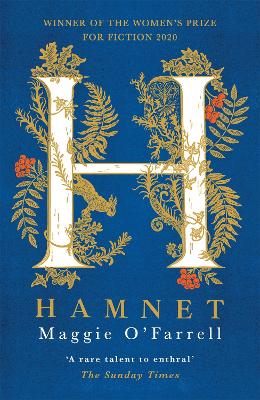Reviewed by Lynn on
This is novel about a famous playwright's son, Hamnet who died at eleven years old. Interestingly, the father's name is never mentioned. He's referred to as Agnes's husband, the glove-maker’s son, the Latin tutor… He's a fascinating secondary character but for me, the real star is Agnes (Anne Hathaway). Of all the character's she's the one, we get to know the most and what a fascinating woman she was.
Going back and forth, we're given glimpses of Agnes' life before she meets her husband. The life she shares with her brother Bartholomew, the volatile relationship with her step-mother and her "gift", which keeps her busy but labels her as someone to stay away from. Meeting the Latin tutor who teaches her step-brothers leads to a hasty marriage and a move away from the farm where she grew up. It's clear there's tension between her husband and his father. Her mother-in-law is an entirely different issue.
Even before Hamnet was born, Agnes is frustrated about the conflicting signs about the second child she's about to give birth to. Even more so, when she delivers twins, Hamnet and his sister Judith. She expected to have only two children, but now she has three. She knows one is likely to die, and that it will probably be Judith, the smaller, sickly one. It's not until the twins are eleven years old that one of them dies, except it, isn't the one anyone expected.
The death of any child is heartbreaking and Agnes and her husband mirror the grief shared by other such parents. However, it's clear as a couple they offer no comfort to each other as each tries to go on with their lives as they did before tragedy struck. The time and distance isn't a healer as they drift apart. The playwright is now famous and busy with his theatre and visits rarely. Yet, his family are not forgotten as he uses his new wealth to buy them a large home unaware of how he's transferred his grief to his writing. That's until word reaches Agnes via her step-mother.
The novel starts slowly, setting the scene in Elizabethan Warwickshire. It's written in the style of the time and as I turned the pages I worried if I'm misjudged my choice. As I continued, the rewards begin to appear, lifting this intriguing story up to a new level as pockets of revealing insight are exposed. The narrative continues in this style until it gains momentum nearer to the conclusion. Overall, it's story which creeps upon you, the effect lasting far longer than expected.
***arc generously received courtesy of the publisher Tinder Press via Random Things Tours***
Reading updates
- Started reading
- 3 April, 2020: Finished reading
- 3 April, 2020: Reviewed
